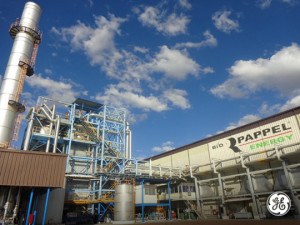Bio-Pappel: Bringing sustainability to the forefront of Mexican manufacturing
Bio-Pappel, the leading producer of paper and paper-based products in Latin America, underwent a radical shift starting in 2011 to become a truly sustainable company. With 27 production plants in Mexico, United States, and Colombia, and a production process that relies on the use of 100%-recycled inputs, Bio-Pappel is well-positioned to continue generating and capturing value for its customers.
In the early days of 2011, the CEO of Grupo Bio-Pappel, Miguel Rincon, started plotting an ambitious transformation to the company founded by his father 25 years earlier. It was in that year that the company, formerly known as Corporacion Durango, was coming out of its second restructuring process and was hoping to benefit from a new era of Mexican consumer expansion. However, Rincon knew that the company would have to be relaunched if it was to recapture its role as the largest manufacturing of paper and paper products in Latin America (including print paper, newspaper, and cardboard boxes).
It was in this moment that the Bio-Pappel turnaround initiated, which was very successful in my opinion. This turnaround was not simply a change in branding, but it also represented a dramatic shift in the value proposition of the company. Prior to 2011, Bio-Pappel had focused on delivering commoditized products to its clients that only differentiated from comparable goods based on quality and a more extensive distribution reach (as Bio-Pappel was located in 40 different production locations, each having an individual distribution network). However, it was clear to Rincon that this would no longer be enough.
The existing and potential customers of Bio-Pappel (who ranged from retail businesses in the print paper market to large conglomerates in the packaging division) had become more sophisticated throughout the years. Differently from before, Bio-Pappel’s customers now placed increasing value to getting products that were environmentally-sustainable. Additionally, while these customers were unwilling to compromise on quality, they were now demanding lower prices for their products. After all, Mexican companies were slowly recovering from the great recession and required lower-cost inputs (like cardboard boxes used to transport their products).
To consolidate its consumer base and reach more sophisticated clients, Bio-Pappel decided to bring sustainability to the forefront of Mexican manufacturing, something that its competitors were unwilling to do. First, the company offered, for the first time in its history, paper and packaging products that were manufactured without cutting a single tree (instead sourcing the pulp required to produce paper from recycled cardboard). Second, Bio-Pappel introduced the first-ever CO2 neutral line of products, which required the company to recapture more CO2 in the production process of a given good relative to its carbon-emissions [1]. Third, the company instituted a dramatic cost-reduction platform to ensure to its customers the lowest-cost products in the market.
As a result of these initiatives, Bio-Pappel was able to generate substantial value for its environmentally-focused customers (for example, the company saves more than 1,878 adult trees every 24 hours by recycling 1,600,000 annual tons of used paper [2]). At the same time, Bio-Pappel has been able to capture significant value as a result of its transition to a sustainability-based platform. Between 2010 and 2014, revenues increased by 18.8%, while the company accomplished an impressive EBITDA margin expansion from 7.5% in 2010 to 15.7% in 2014 [3].
The results attained by Bio-Pappel did not occur in a vacuum. Rather, they were the result of very dramatic changes that the management team instituted in the company’s operating model:
TANGIBLE INVESTMENTS
- Scope, boundary of the firm
- Changed to reflect a new shift towards creating a truly sustainable company, which no longer sourced its raw materials from cut-down trees, but rather from recycled paper and cardboard products
- Capacity / Facilities
- Reduction in the number of plants from 40 units in 2010 to 23 industrial plants and 3 industrial mega-plants in 2015
- Mega-plants, as those located in Monterrey, Tizayuca, Guadalajara and Guanajuato consolidated 10 old plants into just 4, covering the same geographical reach but with a higher capacity utilization [4]
- Introduction of Mega-Plant initiative resulted in significant cost-savings, which could then be transferred to customers
- Technology
- Introduction of state-of-the-art recycling and carbon-footprint reduction introduced across the various production plants
- Shift towards use of natural gas in production plants, that could be sourced through co-generation projects, which are more energy and cost efficient (savings also transferred to customers)
- Reduction in the number of plants from 40 units in 2010 to 23 industrial plants and 3 industrial mega-plants in 2015
INTANGIBLE INVESTMENTS
- Organization / Culture
- Introduction of new Chief Competitiveness and Sustainability Officer, whose primary function became to enact, starting in 2010, the various sustainability-related projects that the company instituted [5]
- Human Capital
- Establishment of Bio-Talent Program, instituted to expand the training and development of employees across Bio-Pappel’s functional divisions and corporate headquarters [6]
- Platform for sustainability projects introduced widely across the firm to encourage employees, along with their families, to participate in recycling, waste reduction and reforestation projects
It is clear that a series of far-reaching modifications were instituted in the operating model of Bio-Pappel. As a result of these changes, Bio-Pappel was able to align its new business model (based on delivering value to its sustainability-focused customers) with its operating model and accomplish improved results combined with a series of awards as a result (including from the World Wildlife Fund, Pulp and Paper International, Forbes, and Mexico’s Labor Ministry, among others) [7].
Source: First-hand recollection from Mr. Miguel Rincon Arredondo, Chairman and CEO, and Mayela Rincon de Velasco, CFO of Bio-Pappel. Company website. Bio-Pappel Sustainability Report.
- http://www.biopappel.com/en/bio-sustainable-company/emissions
- http://www.biopappel.com/en/bio-sustainable-company/urban-forest
- http://cdn.investorcloud.net/biopappel/InformacionFinanciera/ReportesAnuales/2014-ReporteAnual-En.pdf
- http://www.biopappel.com/en/our-company/geographic-presence
- http://www.biopappel.com/en/our-company/organizational-structure
- http://www.biopappel.com/en/bio-sustainable-company/bio-talent-program
- http://www.biopappel.com/en/bio-sustainable-company/awards-and-certifications





SVelasco – thanks for sharing! This sounds like a really amazing company that should be on everyone’s radar. I am interested to know if they have been able to monetize any of their environmental modifications through things like government subsidies or carbon credits. It seems like they are taking really big strides at being a market leader, but from a strategic perspective are they making decisions that support the long term health of their business model? Thanks in advance.
Thanks for your note!
You raise a very interesting question, as the company is just now transitioning towards adopting more decisive actions to monetize their sustainability efforts (mainly focused on selling carbon credits). This is something that was not the first objective of the company as it set out to institute the changes mentioned in the article – rather Bio-Pappel wanted to adapt to changing trends in the market that favored environmentally friendly initiatives. However, as it has been successful in this objective, it is now seeking to further capture value in the carbon credits market. Finally, in regards to government subsidies, unfortunately the Mexican government has been slow to react to the changing customer trends that I mentioned. That said, the company is an active proponent of shifting regulation to support a shift towards sustainability across all Mexican industries.
Interesting company! I am really impressed how they adjusted all of their operations to be more environmentally sustainable. To see this shift impacted so many facets of the firm also demonstrates the requirements for massive change within a manufacturing company. Thanks for sharing!
Thank you Sayiddah. As you well point out, once the company decided that its value proposition had to change, they were very decisive in implementing far-reaching changes across the organization in order to secure the alignment between its business and operating model. Given the size of the company relative to the country in which it operates, this was not an easy task. However, I think it provides us with an example of how this transition towards sustainability can reap many benefits.